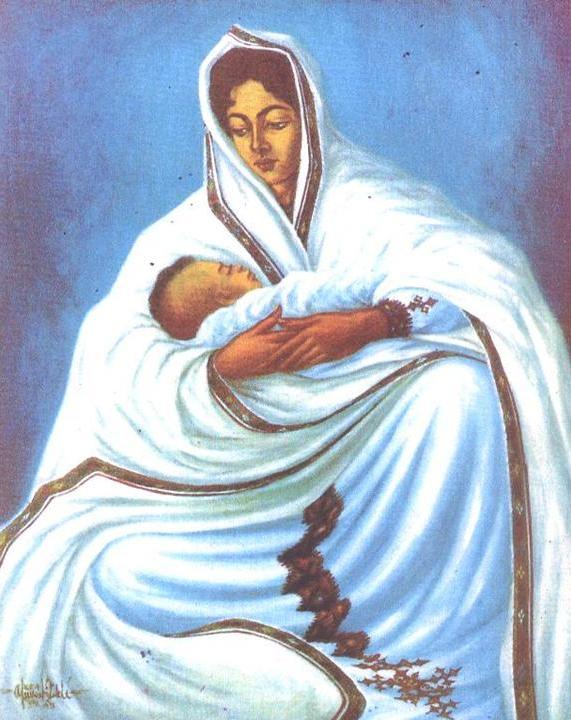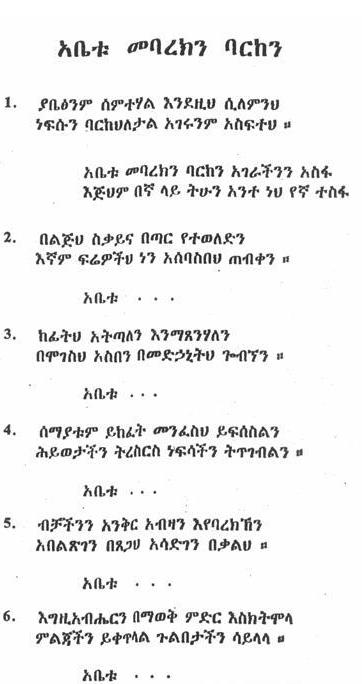Artists

Tekle, Afewerk - VM - Lila Balisky
Afewerk Tekle: Mother Ethiopia

Enlarge Our Spiritual Territory
by Lila Balisky
Afewerk Tekle (born 1932) is without doubt the father and leading figure of Ethiopian art over the past half century. He is famous for designing the stained glass windows depicting Africa’s past, present and future struggles and liberation, which grace Africa Hall in Addis Ababa. He has also won great acclaim for his sculptures, stamps and murals depicting Ethiopian culture and personalities. In Addis Ababa the religious art in St. George’s Cathedral is a striking example of his skill. His work is to be found in many venues from the national art museums to humble coffee houses. The artist’s own residence, Villa Alpha, is a beautiful museum in itself.
Mother Ethiopia (1963) is certainly one of Afewerk Tekle's most striking and evocative paintings. The artist has suggested that the mother is painted in the shape of the map of Ethiopia (prior to Eritrea’s secession in 1993). Symbolism in the painting may be described as follows: The ample folds and draping of the mother’s hand-woven cotton kemis or shemma are to represent the valleys, mountains and potential wealth of the country. Blue represents a peaceful era and the reflection of that peace is seen in the mother’s garment. A child, sleeping and unaware, symbolizes the future of the millions of Ethiopia’s citizens. Expressing care and love for her offspring, the mother cradles the child with gentle hands while she somehow seems to look beyond the baby to the future.
Afewerk Tekle believes that God has asked us to manifest his name in public. The embroidery of the mother’s clothing illustrates the typical richly textured woven Ethiopian designs which often use the motif of the cross in its many configurations. Ethiopian culture and traditional art is saturated with reminders of the suffering and grandeur of the cross. The Marxist revolution (1974-1991) left its scars on Afewerk Tekle in terms of loss of houses, land and friends, but this earlier mother image transcends the strife of governments and political eras. Afewerk Tekle makes clear in his lectures that he desires to ‘leave some hope in all my paintings.’
Another well-known Ethiopian artist, the singer Tesfaye Gabbiso, has composed a prayer song which complements the spirit of Afewerk’s painting Mother Ethiopia in expressing the longings of the Ethiopian faithful for their country. Many of Tesfaye’s songs were of immense blessing, comfort and nurture to the church in Ethiopia during the years of revolution (1974-1991). The distinctive Amharic script is presented alongside the English translation below.
Oh, Lord, Bless Us with a Blessing
by Tesfaye Gabbiso
|
1. You heard Jabez when he prayed;
Likewise you blessed his soul and enlarged his country.
Chorus:
Oh, Lord, bless us with a blessing
Enlarge our spiritual territory.
May your hand be upon us;
You are our hope.
2. We, who are born through the agony and suffering of your Son,
We, too, are your offspring. Gather and keep us.
3. Cast us not from your presence,
we pray.
Remember us by your favor; visit us
with your healing.
4. May the heavens open, your Spirit
pour down upon us.
May our life be soaked, our soul satisfied.
5. Let us not be lonely. Multiply us by blessing us.
Enrich us by your grace; make us grow by your Word.
6. Until the earth fills up by knowing God,
Our pleading continues without our
strength being weakened.
|
 |
********
Afewerk Tekle: Mother Ethiopia, 1963.
Lila Balisky served with SIM Int’l and the Ethiopia Kale Heywet Church with her husband Paul from 1967-2005. Interested in Ethiopian art and song, she published “Theology in Song: Ethiopia’s Tesfaye Gabbiso” (Missiology, October 1997). An Amharic/English diglot of 105 of Tesfaye’s songs is soon to be published in Addis Ababa. Lila has taught in the area of ethnomusicology at the Ethiopian Graduate School of Theology (EGST) in Addis Ababa.
ArtWay Visual Meditation September 4, 2011


